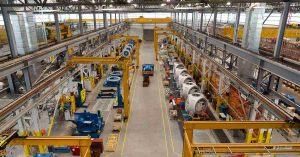Why perform process audits?
So far in this mini-series of podcasts about vetting Chinese suppliers we’ve discussed what quality audits and social compliance audits are and their respective benefits. Since auditing prospective suppliers is such an important part of vetting new suppliers, we now move on to another type of audit: Process audits.

These audits focus on a supplier’s manufacturing reliability and will aim to answer the questions:
- Are they truly experts in the production processes required to manufacture your products?
- Do they follow manufacturing best practices?
- Have they covered all bases to avoid risk?
The auditor will do this by checking the factory’s systems and processes (and those of key suppliers, too), leaving no stone unturned when it comes to sniffing out potential sources of risk. An example would be the tooling’s condition. Is the tooling maintained preventively in order to keep it in an optimal condition in order to provide the best possible quality? It may be that the factory has gotten by with reactively fixing tooling when it has broken down up to now, but this gives an unwelcome level of risk to you, the customer, as tooling which is out of order could lead to order delays, or, before it breaks down it is likely not working at its best capacity which could create more quality issues than acceptable.
Here’s what we’ll be discussing…
As you can imagine, checking these aspects of manufacturing processes and systems in the factory can be quite involved and a good level of understanding of the processes will be very helpful, and this is what we’re going to explain in this episode.
Listen to the episode right here 👇👇👇
🎧 Exploring Process Audits | Vetting Chinese Suppliers (Part 7) 🎧
Here’s a summary of what’s in the episode:
✅ Defining what process audits are with an explanation of what auditors may do when they go on-site into the factory.
✅ The kinds of experience that process auditors will benefit from having. Specifically some prior knowledge about the products and processes being used.
✅ What types of companies will benefit from performing a process audit? Hint: Those with larger orders or technical/high-risk products where you need to reduce risk are better.
✅ Listing WHAT can be checked by the auditor:
- Management systems
- New product introduction
- Specific process controls that are relevant to your needs and product (using plastic injection molding as an example)
- Training & staff evaluation when hiring
- Equipment – funny anecdote about a factory doing CNC machining in a shocking way
- Predictive/preventive maintenance
- Mistake proofing for operators
- Statistical analysis of processes
- Measurement devices
- Environment – good anecdote about a kids’ toy factory
- Office activities
- The shop floor – warehouse and suppliers to check components
✅ What advice to expect from auditors, if any. 3rd party auditors probably won’t provide much, but internal and 2nd party auditors will be able to give some guidance to the supplier about where, how, and why to make improvements.
✅ The points you’ll typically have in a process audit checklist.
Keep going with this topic
All of the following links are relevant to the topics we discussed in this episode:
- Quality System Audits vs. Process-Specific Audits
- This episode used this blog post as its basis: Factory Process & System Audit
- Go back and listen to all of the episodes in our mini-series about vetting Chinese suppliers
- 11 Steps To Set Up a Process Control Plan
- Continuous Auditing to Keep Pressure on a China Factory: How it Works
*****
Are you performing system and process audits on suppliers? How successful have you found them to be?
Please share your thoughts in the comments.
Subscribe to the ‘China Manufacturing Decoded’ podcast 👍
There are more episodes to come, so remember to subscribe! You can do so in your favorite podcast apps here:
- Apple Podcasts
- Spotify
- Stitcher
- Google Podcasts
- TuneIn
- Deezer
- The podcast’s website at China Manufacturing Decoded

Back in the 90’s I introduced Product/ Process audit internal (1st party audits) and Supplier ( 2nd party) audits. They actually benifited the company enormously as the audits focused on the product that was being manufactured and processed internally and or externally, The audits were also based upon the ISO 9000 series.
Thank you, Gordon, for sharing your experience. Yes, paying attention to the product and the processes to make it is really needed, to keep risk low but also to drive improvement.